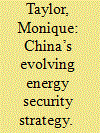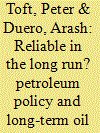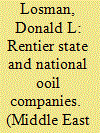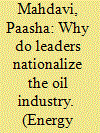|
|
|
Sort Order |
|
|
|
Items / Page
|
|
|
|
|
|
|
| Srl | Item |
| 1 |
ID:
183186


|
|
|
|
|
| Summary/Abstract |
This article explores the ways in which China's energy security strategy has evolved over the past fifteen years. Energy security had become an urgent policy priority for Beijing by the mid-2000s due to China's rapidly increasing oil import dependency set against the backdrop of oil scarcity and rising oil prices. Rather than rely on purely market-based means to secure oil supply, China pursued a state-led or neomercantilist approach. Initially, the most notable and distinctive element of its oil neomercantilism was the overseas acquisition of oil assets by China's national oil companies (NOCs) under broad strategic direction from Beijing. However, increasingly over the past decade China's energy security strategy, while remaining neomercantilist in orientation, exhibits greater reliance on the market. Reasons for this shifting emphasis include the changing geopolitics and geoeconomics of the global oil industry, which moved to oversupply following the US shale oil revolution, along with transformations within the Chinese state under the leadership of President Xi Jinping.
|
|
|
|
|
|
|
|
|
|
|
|
|
|
|
|
| 2 |
ID:
123959


|
|
|
|
|
| Publication |
2013.
|
| Summary/Abstract |
This paper analyzes the determinants of Chinese government support for methanol automobile fuel development. At the national level, a preference for low carbon alternatives, ongoing bureaucratic restructuring, and profitability concerns of the national oil companies (NOCs) help to explain a lack of support for methanol fuel. At the local level, a short-term and localized view of industry development explains why some governments actively promote methanol fuel through local standardization, subsidies, and management of NOC opposition. The case of methanol fuel illustrates how local governments with strong, embedded interests have filled in the national-level policy vacuum on this issue. These findings contribute to the ongoing debate on the evolving central-local relations in China and hold lessons for alternative fuel adoption efforts underway in many parts of the world.
|
|
|
|
|
|
|
|
|
|
|
|
|
|
|
|
| 3 |
ID:
125565


|
|
|
|
|
| Publication |
2013.
|
| Summary/Abstract |
Control of natural resources, especially oil and gas, has been a major issue in the consideration of underdevelopment. In the present commodity boom, some Latin American economies are reforming their resource exploitation regimes, especially those issues linked with foreign capital share. The purpose of this report is to analyze these changes in the Bolivian and Brazilian oil and gas sectors in order to answer such questions as: Which property system combining public and private capital is the most suitable? Which regulating framework can guarantee a sustainable increase in output and investment? Our analyses lead to the conclusion that the regulatory framework can establish a particular ownership structure that is considered favorable for improving the performance of oil and gas sector, but the internal dynamics and the historical trajectories of enterprises will also be determining factors that interact with the given regulatory framework, generating mixed results.
|
|
|
|
|
|
|
|
|
|
|
|
|
|
|
|
| 4 |
ID:
072435


|
|
|
| 5 |
ID:
115168


|
|
|
|
|
| Publication |
2012.
|
| Summary/Abstract |
This paper argues that both China and the Western countries need to de-politicize China's global quest for energy security. The Western politicians need to recognize that their rhetoric in relation to China's efforts to secure energy supplies overseas has done nothing but intensify China's fear that they might seek to deny China's access to the oil it needs for the development. China needs to reconsider its stance of distrusting global oil markets and to recognize that the reliance on aggressive acquisitions of overseas oil fields and equity oil production has been of little help in strengthening its energy security. Given that China's energy security depends increasingly and deeply on the stability of global oil markets and reliable and growing oil supplies to the market, China shares with other major oil importing countries profound common interests in maintaining and strengthening the stability of global oil markets and reducing the chance of potential disruptions to oil supply and the resulting damaging oil price shocks.
|
|
|
|
|
|
|
|
|
|
|
|
|
|
|
|
| 6 |
ID:
109697


|
|
|
|
|
| Publication |
2011.
|
| Summary/Abstract |
Accelerating oil import dependence in energy consuming nations highlights the importance of having energy supplies at sufficient levels and at stable and reasonable prices. Consequently, it is crucial that oil exporters realize their full production potential. Current debates on energy security are often focused on short-term risks e.g. sudden disruptions due to wars, domestic instability, etc. However, when it comes to assessing oil supplier reliability it is equally important to assess their longer term ability and willingness to deliver oil to the global market. This study analyzes the effects of petroleum investment policies on crude oil production trends in 14 major oil producing countries (2000-2010) by focusing on the political-institutional frameworks that shape the investment conditions for the upstream oil sector. Our findings indicate that countries with less favorable oil sector frameworks systematically performed worse than countries with investor friendly and privatized sectors. The findings indicate that assessments based on remaining reserves and planned production capacities alone could inflate expectations about future oil supplies in a world where remaining crude reserves are located in countries with unfavorable investment frameworks.
|
|
|
|
|
|
|
|
|
|
|
|
|
|
|
|
| 7 |
ID:
097885


|
|
|
|
|
| Publication |
2010.
|
| Summary/Abstract |
While the concept of the rentier state is common knowledge to Middle East scholars, very little has been written concerning the basic support and revenue tool for such states - the national oil companies. This article examines the micro-economic, financial, and managerial behavior of national oil companies, assesses their economic efficiency, and relates their operations to rentier state politics.
|
|
|
|
|
|
|
|
|
|
|
|
|
|
|
|
| 8 |
ID:
136233


|
|
|
|
|
| Summary/Abstract |
Why do leaders nationalize the oil industry? In line with a general utility-maximizing theory, I argue that leaders nationalize to maximize state revenues while minimizing costs. The latter includes international retaliation and domestic political constraints. Using a novel longitudinal dataset on the establishment of national oil companies (NOCs), the empirical evidence presented in this paper lends support to four primary findings. States are most likely to establish NOCs (1) in periods of high oil prices, when the risks of expropriation are outweighed by the financial benefits; (2) in non-democratic systems, where executive constraints are limited; (3) in “waves”, that is, after other countries have nationalized, reflecting reduced likelihood of international retaliation; and, though with weaker empirical support, (4) in political settings marked by resource nationalism. This last factor is proxied by OPEC membership in large-N analysis and, in a two-case comparison, by the difference in retained profits between the host and foreign governments. The theory and empirics presented here offer some clues for policy makers and multinational companies alike as to when to expect leaders to opt for nationalization.
|
|
|
|
|
|
|
|
|
|
|
|
|
|
|
|
|
|
|
|
|